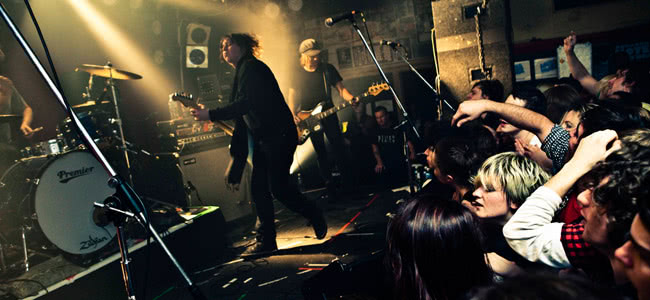After championing the cause against Melbourne’s Palace Theatre being demolished to develop luxury apartments and loosening Victoria’s restrictive all ages concert laws, industry body Music Victoria is pushing for further reforms of state legislation and classification to help lessen the prohibitive red tape surrounding live music venue operators.
Music Victoria made a submission to the state’s red tape commissioner John Lloyd last week, hoping to address the issues faced by live music venues under the current regulations, including altering classifications under the Building Code of Australia, as Arts Hub reports.
Under the current Building Code, Victorian venues fall under only one of two broad classifications, a Class 6 building – such as retail shops, bars, hotels, and restaurants – or a Class 9B structure, such as sports stadiums and airports. As soon as a venue with a Class 6 listing wants to offer live music, it is forced to undergo reclassification as a Class 9B building – along with the hefty compliance costs that go with it.
Music Victoria CEO Patrick Donovan explains: “‘In a nutshell, if a venue is dedicating more than 10% of its floor space to entertainment, it’s reclassified from a Class 6 building – which is basically the equivalent of retail shops – to a class 9B building, which is an assembly building: basically large sports stadiums, large schools and universities, even the airport.” “We feel that music’s being discriminated against there, just like it has been in some other areas like underage gigs.” – Patrick Donovan, Music Victoria
“The idea of [Fitzroy live music venue] The Old Bar requiring the same fire hazard compliance as the airport is fairly ridiculous,” adds Mr. Donovan.
Under current regulations, any Victorian venue wanting to add to the live music scene must undergo Class 9B compliance, meaning the costly installation of sprinkler systems, smoke detectors, 24 hour security monitoring, fire brigade connection, smoke extraction, fire rating isolation, structural refurbishments, and a host of other costly safety provisions.
“We’ve actually done a hypothetical costing of what it would cost a traditional pub, a traditional Victorian building to basically comply to a 9B,” says Donovan, who had a developer run a reclassification quote “pro bono” as a test. “We got the original floor plans from [historical Brunswick venue] the Punters Club, and they estimated it would cost $470,000 to become compliant with a 9B,” says the Music Victoria CEO.
“So if you multiply that $470,000 by Victoria’s 560 venues, then that’s $263.2 million, which the music industry certainly can’t afford,” he adds.
“Our biggest concern is that it’s a lot easier for licensees and publicans to put up a big screen and put the footy on, or encourage the pokies, because 200 people watching a Socceroos game or the Ashes on the big screen is still classed as a Code 6 whereas if that’s suddenly a guitarist playing a few songs, even if he’s got half the crowd, that’s a 9B, so we feel that music’s being discriminated against there, just like it has been in some other areas like underage gigs,” he continues.
Having already made a submission to Commissioner Lloyd, prompting him to “try and slash red tape on some of these issues… that needs a bit of reform,” says Donovan, they are additionally in the “very long-winded process” of making consultations on a more detailed submission; “and then there’ll be approvals by a number of boards and the Planning Minister and possibly 1 May next year it might be implemented,” Donvoan details.
‘The whole idea with the red tape commissioner is that it’s done quickly, and it’s just based on common sense, so I would imagine that we’d see something happen before the end of the year,” Donovan enthuses,”it would certainly encourage more pubs and businesses to put on live music because you won’t have those prohibitive costs.”
The significant Building Code reforms would have a huge beneficial impact on Victoria’s live music scene, which contributes more than $1 billion to the economy, as revealed by Music Victoria’s recent report saying that live music did bigger business than the AFL.
New South Wales, which recently underwent Building Code reform along with the deregulation of liquor licensing, has benefited greatly from its recent shifts in legislation. “Little bars are popping up everywhere [there],” as Donovan points out, “NSW is really rejuvenating whereas Victoria seems to be losing a couple of venues at the moment.”

































